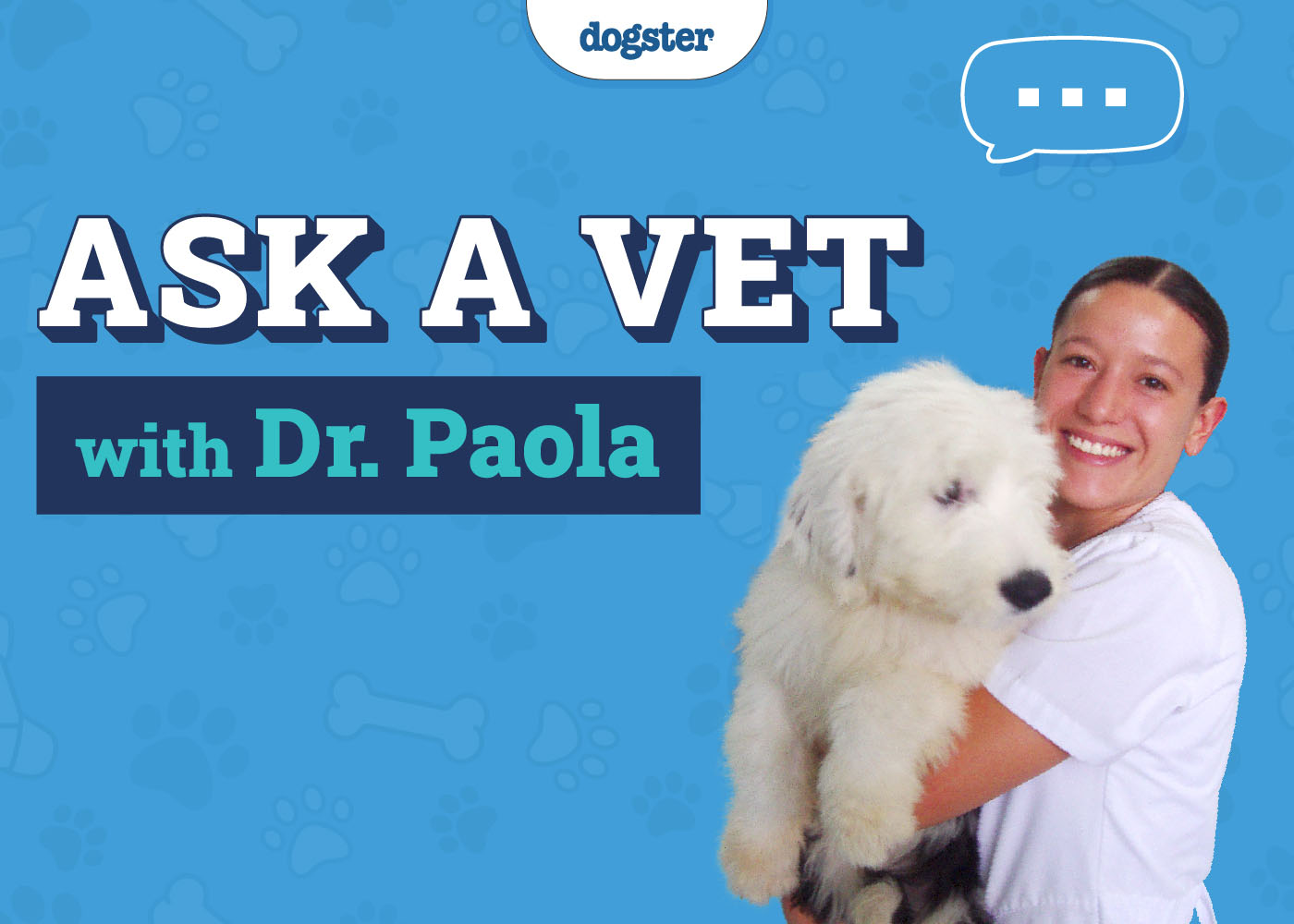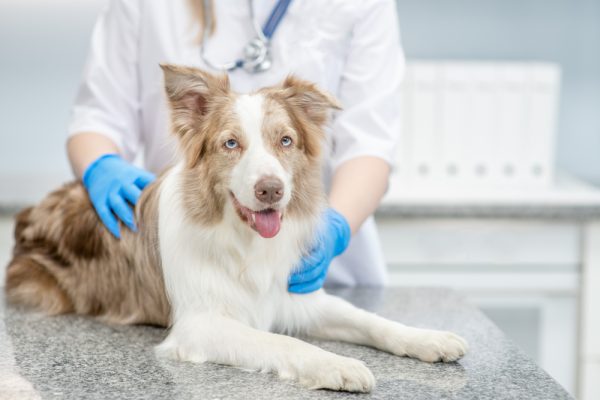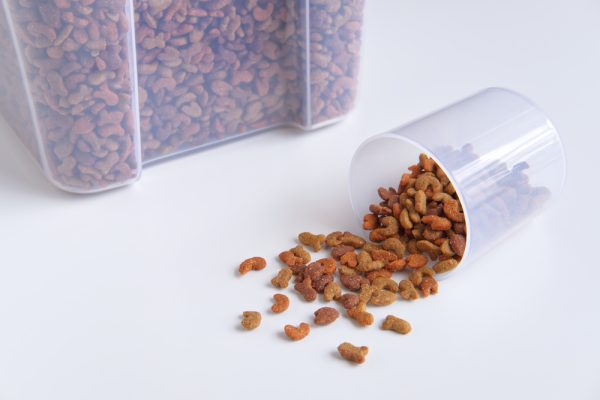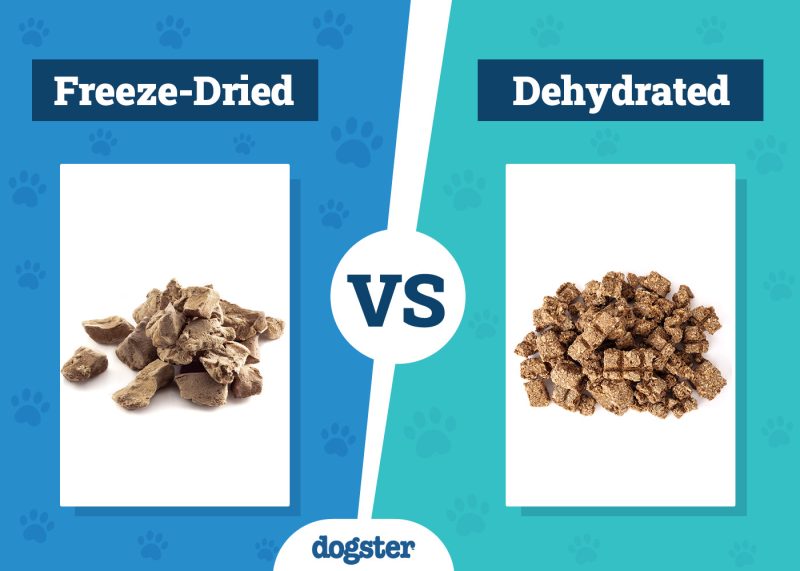Welcome to our “Ask Dr. Paola” series, where every Monday we bring expert advice straight from Dr. Paola Cuevas (MVZ) to help our readers better understand their dog’s health and well-being.
Whether you’re a new pet parent or a seasoned dog lover, Dr. Paola is here to provide answers to your most pressing questions. From nutrition tips and preventive care to troubleshooting common behavioral issues, Dr. Paola is ready to offer insights that will keep your furry friend happy and healthy. Stay tuned for expert guidance on a range of topics that matter most to you and your dog, so you can make informed decisions and provide the best possible care for your canine companion. Have a question? Send it in here!

Help! My Dog Is Sitting Sideways. Could It Be Their Hips?!
“Hi Dr. Paola,
Abigail is a 2.5-year-old Shepherd/Lab mix. Recently, I have noticed that when she sits, she sits to the side and has to lean against something. The vet said it’s her knees, but I think it’s her hips. She prescribed pain meds, and now Abigail can run like crazy.
My question is, do I need to give her some kind of supplement? And if so, which one? I have wasted money on so many. Any help is very appreciated.
Thank you for your time.” – Anna
Hi Anna,
You’re absolutely right to want a clear and effective approach for Abigail without wasting time or money on unproven products. At two and a half years old, a Shepherd-Lab mix showing this kind of seated posture may indeed be compensating for discomfort in either the hips or the knees. While your veterinarian observed changes in the knees, your concern about her hips is valid and quite common in breeds prone to both hip dysplasia and cruciate or patellar issues. The fact that she responds well to pain medication suggests inflammation is present, regardless of the exact joint affected.
Joint supplements can be helpful, especially those backed by peer-reviewed research. Look for a product that contains proven ingredients such as glucosamine hydrochloride, chondroitin sulfate, and undenatured type II collagen (UC-II). These support cartilage health and joint comfort. Omega-3 fatty acids, particularly those derived from marine sources like fish oil, are also anti-inflammatory and have shown benefits in controlled studies. Dasuquin Advanced, GlycoFlex III, or Movoflex are examples of veterinary-recommended joint supplements with good evidence and bioavailability. Consistency is key here; these aren’t quick fixes but long-term support tools. If Abigail is overweight, even slightly, managing her body condition can have a greater impact on joint comfort than any supplement.
Since you’re already working closely with your vet, consider asking for radiographs of her hips and stifles (knees) to better understand where the structural changes are occurring. This will help guide both treatment and preventive strategies more precisely, avoiding further guesswork or wasted spending.
Good luck!
– Dr. Paola

If you want real time answers to your questions, you can talk to one of our veterinarians online. Click on the image or button below:


Help! My Dog Is Sneezing a Lot!
“Hello Dr. Paola,
Cooper is an 18-month-old Goldendoodle. He is a joy with lots of energy. Just in the last week or so, he’s been sneezing a lot. What are some things we can try to stop the sneezing?
Thank you.“ – Judy
Hi Judy,
Thank you for reaching out and for sharing a little about Cooper. At 18 months old and full of energy, a sudden onset of sneezing that persists for more than a few days is something worth paying attention to, especially if there’s no obvious trigger. Sneezing in dogs can be caused by several things, including environmental irritants like dust, pollen, or household cleaners, as well as more specific issues like foreign material (for example, a grass awn/foxtail lodged in the nasal passage), mild upper respiratory infections, or even dental problems that affect the nasal cavity. In younger dogs, foreign bodies are a common cause, particularly if the sneezing started suddenly and includes pawing at the nose or discharge coming from one nostril.
To help Cooper at home, consider whether there have been any recent changes to his environment. Vacuuming frequently, using air purifiers, and avoiding strong scents like sprays or candles can minimize exposure to irritants. If he enjoys sniffing around outdoors, try gently rinsing his nostrils with sterile saline using a veterinary nasal rinse to help clear out allergens or debris. However, if the sneezing is frequent, worsens, or is accompanied by nasal discharge, especially if it’s one-sided or contains blood, it’s important to have him examined. In these cases, a veterinarian may need to perform a rhinoscopy or imaging to check for inflammation, infection, or a foreign object. Mild, seasonal sneezing can sometimes resolve on its own, but persistent or progressive signs should always be investigated to avoid complications.
Best,
– Dr. Paola

Help! My Dog Keeps Scratching Their Neck and Ears!
“Dear Dr. Paola,
I recently got a new Cavapoo puppy, Frida, and she won’t stop scratching her neck and ears! She will be running around and then suddenly stop to scratch herself. I don’t know if it’s her collar or something else. At her last vet visit before she came home, her vet said she was healthy, so I’m worried it might be stress.
Help!” – Julia
Hi Julia,
Congratulations on welcoming Frida into your home. Cavapoos are such bright, affectionate little dogs, and it sounds like she’s already full of life. When a young puppy suddenly begins scratching around their neck and ears, it’s important to consider both physical and behavioral causes. Given her age and the specific location, this is more likely to be dermatologic, rather than stress-related. Puppies often react to new collars, especially if they are made of rough or synthetic materials that can irritate delicate skin. If the collar is too tight or has sharp edges or tags rubbing her neck, that could certainly cause the scratching. Try removing the collar for a few hours under supervision and see if the behavior decreases.
However, persistent scratching in the ears or around the base of the ears can also be an early sign of external ear infections, allergies, or even external parasites like mites or fleas. Just because her last veterinary exam was normal doesn’t rule out something that may have developed since, especially now that she’s in a new environment. Puppies have immature immune systems and can quickly react to changes in diet, grooming products, or even new detergents used on bedding. If the scratching continues, worsens, or is accompanied by redness, head shaking, or a bad odor from the ears, I recommend having her rechecked promptly. While stress can sometimes heighten awareness of sensations, true pruritus always has an underlying cause that needs to be addressed directly. Such conditions tend to worsen, so please don’t wait.
Sincerely,
– Dr. Paola
- View past week’s questions here: August 11, 2025
- See our full list of past articles here
- Click here to submit a question





















